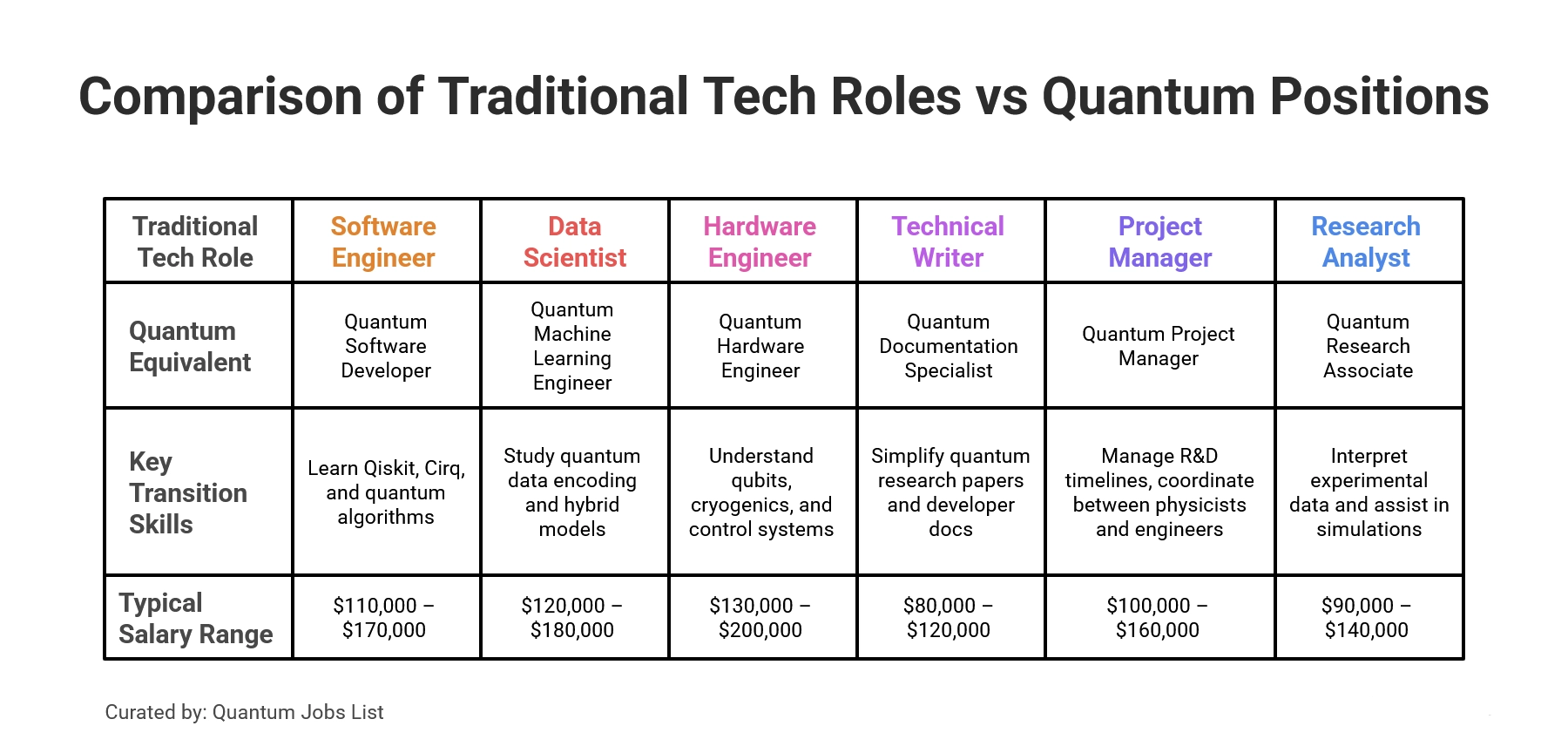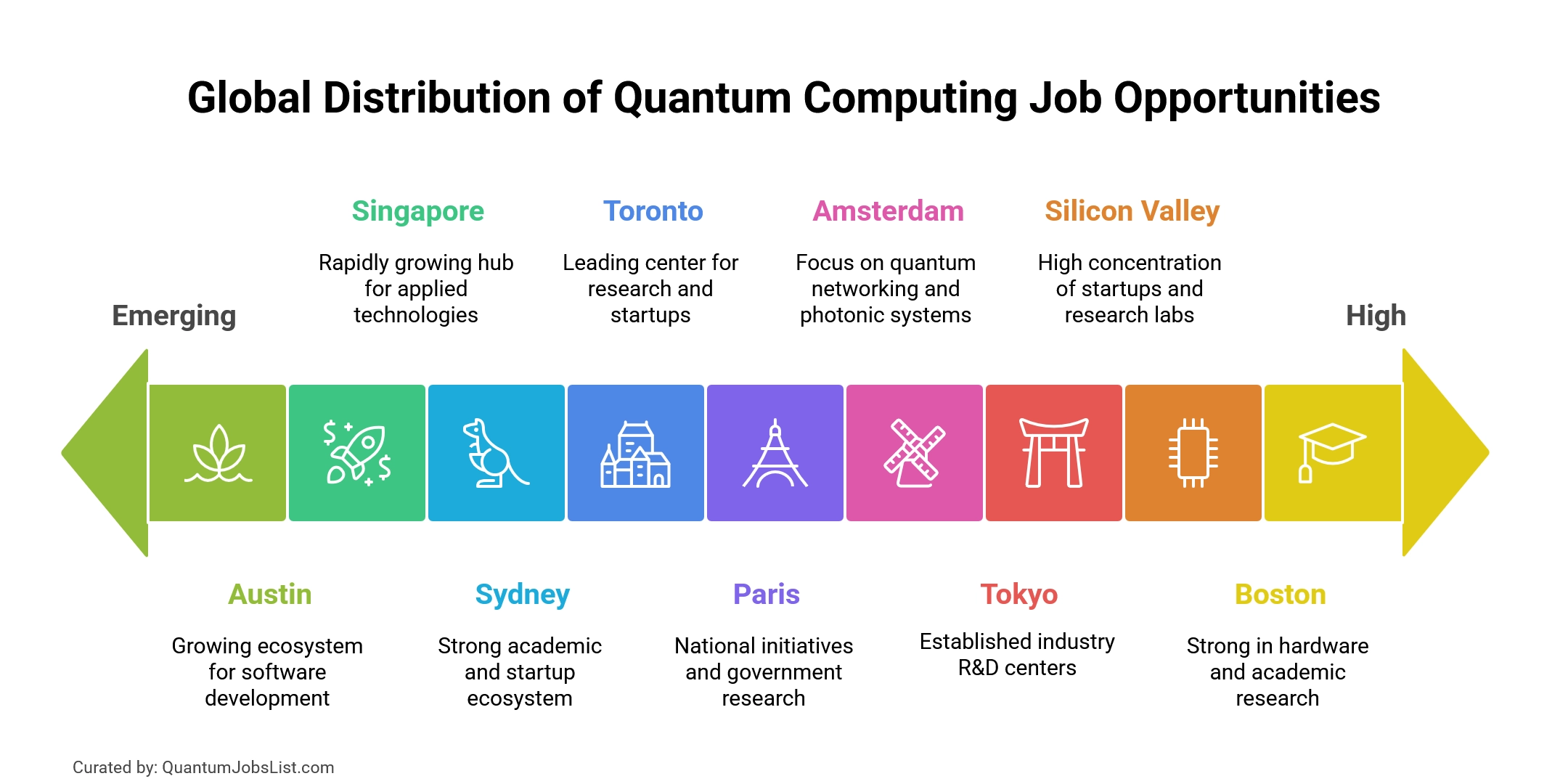12 Min. Read
Oct 18, 2025
How to Get Quantum Jobs Without a PhD in 2026
Learn how to get quantum jobs in 2026 without a PhD using hands-on training, online courses, and real experience.
The quantum computing industry is exploding with opportunities, but here's a secret many don't know:-
you don't need a PhD to land a high-paying quantum job.
According to the Chicago Quantum Exchange, less than 50% of the job openings in quantum didactics seek PhDs. While the media focus on the PhD screen imposed by universities and research institutes, the real action is in the the companies looking for practical quantum skills.
There are a lot of skills that people can get in other areas that are totally transferrable [to quantum tech]. Marie Grubb, Lead technician at Infleqtion
This is the only resource you need to to to get into quantum computing with only a bachelor’s degree. I focus on six career paths offered with salaries of $70,000 - $180,000. I also detail skills companies need that are in demand. If you are a software developer who wants to switch to quantum, or a graduate who wants to enter a career that is on the frontier of technology, quantum jobs are available and there is no need for a PhD.
There are companies that want to offer the training and will hire those with the desire and skills needed to enter quantum. Let's see how you can be one of those people.
Why Quantum Jobs Don't Always Require PhDs?
The quantum computing industry faces a massive talent shortage, that's reshaping hiring requirements across the sector. Traditional academic pathways simply can not produce qualified professionals fast enough to meet exploding demand; This reality has forced companies to rethink their approach to quantum hiring.
Do All Quantum Jobs Require a PhD?
Chicago Quantum Exchange Research (2024) found that , "Fewer than half of quantum jobs need PhDs; employers say curiosity, basic retraining, and skills developed in other fields are the keys to getting hired for many roles."
This shift represents a fundamental change in how the industry views talent acquisition.
Quantum Careers Beyond Research
The quantum field spans far beyond pure research. While quantum physicists chase theoretical advances, the industry needs software engineers to develop quantum applications, and technical writers to clarify intricate systems. Project managers to oversee coordination among several disbursed development teams, and sales engineers to sell quantum technology. These are reasonably practical skills. These skills can be acquired with targeted training, not with several years of a PhD programme.
This hiring revolution is driven by the largest employers. Microsoft, Amazon, Google, and IBM have come to the understanding that many quantum positions can be filled by savvy hires and have designed appropriate training resources to provide the needed quantum knowledge. After all, a curious software engineer can be far more valuable and expedient than an abstract theoretical physicist.
Why Non-PhDs Are Key to Quantum Growth?
This is increasingly a necessity to develop the profession. As quantum computing advances beyond research facilities to commercial applications, there is need for professionals with the ability to bridge the gap between complex quantum principles and practice in the business world. Communication, business, and technical skills of sufficient depth can be acquired without a PhD and are essential to substantive bridge building.
Quantum Computing Jobs Market Outlook
Market data supports this evolution. The global quantum computing market is projected to reach $8.5 billion by 2030, creating an estimated 840,000 new jobs. The mathematics simply don't work if every position requires a PhD; there aren't enough quantum physicists in the world to fill these roles.

What are top 10 Quantum Career Paths Without PhD. ?
The quantum computing field also provides various job opportunities for those having bachelor’s degrees and the necessary skills. Each option entails different challenges and opportunities, pays well, and offers substantial growth opportunities without the need for post-doctorate level research.
1. Quantum Software Engineer
Salary Range: $95,000 - 165,000 a year
Industries: Tech companies, quantum startups, defense contractors
Qualification: Bachelor's in Computer Science, Physics, or Mathematics
Responsibilities:-
- You will use Qiskit, Cirq, and Q# to make quantum algorithms and applications;
- Toubleshoot quantum circuits to aid in tailoring them to specific hardware;
- Work with hardware teams to help them increase system efficiency;
- You will convert proposed quantum theories to practical codes.
Skills Required:-
Strong programming fundamentals in Python, C++, OR JavaScript; Mathematical understanding of linear algebra & probability theory; Experience with quantum programming frameworks; Problem-solving and analytical thinking abilities.
2. Quantum Applications Developer
Salary Range: $85,000 - 140,000 a year
Industries: Finance, healthcare, logistics, consulting
Qualification: Bachelor's in Software Engineering or related field
Responsibilities:-
- You will design quantum enhanced applications with business applications in mind.
- Design quantum machine learning models tailored to several industries.
- Design algorithms aimed at optimizing supply chains and financial systems.
- You will work with hybrid architectures that blend classical and quantum systems.
Skills Required:-
Understanding of both quantum computing & industry specific challenges; Experience with hybrid classical quantum systems; Business application development expertise; Domain knowledge in target industries.
3. Quantum Technical Writer
Salary Range: $70,000 - 120,000 a year
Industries: Quantum companies, tech documentation firms, consulting
Qualification: Bachelor's in Technical Communication or STEM field
Responsibilities:-
- You will draft user documentation and quantum systems API guides.
- Create quantum educational guides and resources that include tutorials.
- Help with writing technical blogs and white papers.
- You will explain intricate quantum ideas to people of different levels.
Skills Required:-
Strong writing and communication abilities; Technical understanding of quantum computing principles; Experience with documentation tools & content management; Ability to work with engineering teams.
4. Quantum Sales Engineer
Salary Range: $90,000 - 180,000 a year (plus commissions)
Industries: Quantum hardware/software companies, consulting firms
Qualification: Bachelor's in Engineering or Business
Key Responsibilities:-
- You will run technical demonstrations aimed at potential clients.
- Communicate quantum benefits and business value propositions.
- You will work with sales personnel by providing them the needed technical information.
- Help clients plan the strategy to implement quantum.
Skills Required:-
Technical competency in quantum computing concepts; Strong presentation and communication skills; Sales experience and customer relationship management; Business development and negotiation abilities.
5. Quantum Project Manager
Salary Range: $95,000 - 150,000 a year
Industries: Research institutions, consulting firms, tech companies
Qualification: Bachelor's degree plus Project Management certification
Responsibilities:-
- Oversee quantum development projects of high complexity.
- You will track and manage the project timeline, budget, and resources.
- Bridge the communication gap between the technical and the business teams.
- You will make sure the project satisfies the set business objectives.
Skills Required:-
Project management methodologies (Agile, Scrum); Stakeholder management and communication; Basic understanding of quantum computing concepts; Risk management & problem-solving abilities.
6. Quantum Test Engineer
Salary Range: $80,000 - 130,000 a year
Industries: Hardware manufacturers, testing laboratories, quality assurance firms
Qualification: Bachelor's in Electrical Engineering or Physics
Responsibilities:-
- Establish and implement strategies for testing quantum systems.
- Review the performance and reliability of quantum systems.;
- Detect and resolve hardware problems.
- Work with the engineering teams on systems enhancements.
Skills Required:-
Understanding of quantum hardware principles; Experience with measurement and testing equipment Statistical analysis and data interpretation; Quality assurance methodologies.
7. Quantum Data Scientist
Salary Range: $100,000 - 155,000 a year
Industries: Research institutions, tech companies, consulting firms
Qualification: Bachelor's in Data Science, Statistics, or Computer Science
Responsibilities:-
- Employ quantum algorithms in machine learning.
- Evaluate performance data in quantum computing;
- Create advanced analytics solutions using quantum computing.
- Investigate the quantum advantages of data processing.
Skills Required:-
Strong background in statistics and machine learning; Experience with Python, R, & data analysis tools; Understanding of quantum machine learning algorithms; Research and analytical thinking abilities.
8. Quantum Systems Administrator
Salary Range: $75,000 - 125,000 a year
Industries: Cloud providers, quantum companies, research institutions
Qualification: Bachelor's in Information Technology or Computer Science
Responsibilities:-
- Oversee the cloud infrastructure for quantum computing;
- Check system performance, availability, and uptime;
- Manage user permissions, access, and resource distribution;
- Resolve issues with system performance and connectivity.
Skills Required:-
Experience with cloud platforms (AWS, Azure, Google Cloud); System administration and network management; Understanding of quantum computing workflows; Problem solving and troubleshooting abilities.
9. Quantum Product Manager
Salary Range: $110,000 - 170,000 a year
Industries: Tech companies, quantum startups, consulting firms
Qualification: Bachelor's in Business, Engineering, or Computer Science
Responsibilities:-
- Establish and communicate the vision and strategies for quantum roadmaps;
- Facilitate collaboration among engineering, sales, and marketing teams;
- Collect and synthesize customer needs and market insights;
- Direct the development and market strategy of quantum offerings.
Skills Required:-
Product management experience & methodologies; Understanding of quantum computing market dynamics; Strong analytical & strategic thinking abilities; Cross-functional collaboration and leadership skills.
10. Quantum Cybersecurity Specialist
Salary Range: $90,000 - 145,000 a year
Industries: Cybersecurity firms, government agencies, financial services
Qualification: Bachelor's in Cybersecurity, Computer Science, or Mathematics
Responsibilities:-
- Create solutions for post-quantum cryptography;
- Evaluate the quantum threats to current security systems;
- Execute security protocols that are quantum safe;
- Prepare organizations for possible quantum threats to security.
Skills Required:-
Cybersecurity fundamentals & threat analysis; Understanding of cryptography and security protocols; Knowledge of post-quantum cryptographic algorithms; Risk assessment and security planning abilities.
Just like classical computing, where the majority of developers don’t have PhDs, we are working towards the future where anyone tackling a complex problem can utilize a quantum compute; even without a background in quantum physics. Jay Gambetta, Vice President, IBM Quantum
%20-%20visual%20selection.webp)
What are Essential Skills for Non-PhD Quantum Professionals?
Getting into quantum computing without a PhD means that you need to create a plan to develop the appropriate strategies in the technical, mathematical, and soft skill areas. Fortunately, the majority of positions in quantum science appreciate hands-on experience more than academic theory, so directed study in the area tends to work better than more general study.
1- Technical Skills Foundation
Programming proficiency forms the foundation of most quantum careers. The quantum programming landscape centers around several key languages:-
- Python is leading the way in quantum development thanks to user-friendly libraries like Qiskit, Cirq, and PennyLane.
- JavaScript is becoming more popular, especially for developing quantum web apps and cloud interfaces;
- C++ is still vital for developing quantum simulators and for high-performance interfacing with quantum hardware;
- Q#, Silq, and other specially designed programming languages and environments provide a more direct way to quantum program.
The key is becoming comfortable with quantum-specific programming concepts like quantum circuits, gates, and measurements rather than mastering every language immediately.
2- Mathematical Requirements
Mathematical foundations matter, but don't require PhD-level depth. Focus on practical understanding rather than theoretical mastery:-
- Linear algebra is important because the core components of quantum computing are vectors, matrices, & eigenvalues.
- For understanding measurements and the resulting interpretations, a quantum system involves probability and statistical reasoning;
- Manipulating a quantum state and the operation of quantum gates involves complex numbers and trigonometric functions;
- For quantum algorithms and the associated computational complexity, discrete mathematics is beneficial.
Most professionals can master these concepts through focused online courses rather than formal degree programs.
3- Quantum Computing Concepts
Quantum computing concepts can be learned progressively:
Fundamental Level:-
- Superposition, entanglement, and quantum interference.
- Quantum gates & circuit construction.
- Measurement and quantum state collapse.
- Quantum vs. classical computing differences.
Intermediate Level:-
- Quantum algorithms like Grover's search and Shor's factoring.
- Quantum machine learning principles.
- Hybrid classical-quantum systems.
- Quantum programming frameworks.
Advanced Level:-
- Quantum error correction & fault-tolerant computing
- Quantum hardware architectures
- Quantum communication protocols
- Industry-specific quantum applications
4- Industry Knowledge
- In finance, actively work on projects in portfolio optimization, risk analysis, and fraud detection.
- In healthcare, work on drug discovery , molecular simulation, and medical imaging;
- In cybersecurity, work on post-quantum cryptography & quantum key distribution;
- In logistics, work on route optimization and supply chain management.
Following quantum computing news, attending virtual conferences, & engaging with quantum communities on LinkedIn and Reddit builds industry awareness.
5- Communication and Soft Skills
- Technical writing: Have experience in writing core documentation on complex quantum systems.
- Presentation skills: Present quantum ideas to non-technical stakeholders;
- Collaboration: Integrate well and work synergistically within diverse teams across various quantum projects;
- Problem-solving: Employ innovative and critical thinking when tackling various quantum challenges.
Businesses seek engineers, software developers, designers, technical writers, project managers, & several other professionals who do not hold a doctoral degree; but a master's degree at most.
6- Practical Experience Development
- Engaging in open-source initiatives by contributing to quantum projects on GitHub.
- Working on the Qiskit Textbook’s quantum challenges to deepen my understanding.;
- Developing basic quantum applications as part of my portfolio through personal project initiatives;
- Joining quantum hackathons and contributing to online discussions to foster community participation.
7- Quantum Certification and Validation
- Earning the IBM Qiskit Developer Certification as a professional credential in quantum programming.
- Acquiring the Microsoft Azure Quantum Certification to obtain validation for cloud-based quantum development.
- Receiving the Google Cirq Certification for demonstrating my skills in programming quantum circuits.
- Completing quantum computing courses and acquiring university certificates from institutions like MIT or Stanford.
These programs often provide more targeted quantum skills than traditional computer science degrees & demonstrate serious commitment to quantum computing careers.
How to Build Quantum Skills from Scratch?
Moving into quantum computing requires a structured approach to build a foundation while obtaining practical experience sought after in the job market. Depending on your background, it usually takes between 6 to 18 months, but this is a worthwhile investment due to the lucrative and high-growth career opportunities available.
Phase 1:- Mathematical Foundations (Months 1-2)
Start with essential mathematics that underlies quantum computing:-
- Linear algebra fundamentals:- For the best free courses on vectors and matrices, as well as eigenvalue problems, check KA.
- Complex numbers:- Take MIT's Introduction to Complex Numbers as it covers quantum state representation.
- Basic probability:- Learn the basics of probability to understand the statistical concepts used to interpret measurements in quantum theory.
- Trigonometry review:- Necessary for manipulating and controlling states in quantum theory.
Don't aim for mathematical perfection; focus on understanding concepts well enough to work with quantum programming libraries.
Phase 2:- Quantum Programming Basics (Months 2-4)
Master quantum programming through hands-on practice:-
- IBM Qiskit textbook:- The most thorough free textbook and the best introductory resource on quantum programming.
- Microsoft quantum Katas:- Learn quantum programming by completing these interactive coding tasks;
- Cirq tutorials:- This is Google quantum programming framework, it comes with practical programming examples.
- PennyLane courses:- A programming platform focusing on quantum machine learning.
Work through exercises systematically, building simple quantum circuits and running them on quantum simulators.

Phase 3:- Specialization Path (Months 4-6)
Choose your focus based on career goals:-
For those in finance:
Using quantum algorithms in portfolio optimization and in risk analysis through quantum Monte Carlo methods, applying quantum machine learning for detecting fraud, and assessing the correlation of quantum blockchain and cryptography.
For those in drug discovery and healthcare:
Developing quantum algorithms for drug discovery and molecular simulations, applying quantum machine learning in medical imaging, and using quantum sensing for healthcare.
For those in cyber security:
Developing post-quantum cryptography standards, quantum key distribution methods, and methods of quantum random number generation, and evaluating the security of quantum systems.
For those in software development:
Designing quantum software architecture and classical-quantum hybrid systems, working with quantum cloud computing, and creating methods for quantum debugging and testing.
Phase 4:- Portfolio Development (Months 6-8)
Build demonstrable quantum projects:-
- Develop documentation for each project and for explaining the quantum concepts involved.
- For each quantum program you write, prepare a GitHub repository;
- Implement algorithms of classical quantum computing like Deutsch-Jozsa and Grover's search, and gradually move on to more complex ones;
- Apply quantum technology to solve problems in the industry of your choice.
Many hiring managers evaluate quantum candidates based on their ability to explain quantum concepts clearly through their portfolio work.
Phase 5:- Community Engagement (Ongoing)
Connect with the quantum community:-
- LinkedIn group:- Join quantum computing professional groups
- Reddit participation:- Engage in r/QuantumComputing discussions
- Virtual conference:- Attend IEEE Quantum Week, Quantum.Tech, and other industry events
- Local meetup:- Participate in quantum computing meetups in your area
The quantum community is surprisingly accessible & supportive of newcomers who demonstrate genuine interest and curiosity.
Phase 6:- Certification and Validation (Months 8-10)
Pursue relevant certifications:
- IBM Qiskit Developer Certification. Acknowledges expertise in quantum programming.
- Microsoft Azure Quantum Certifications. Validates professional competency in cloud-based quantum development.
- University certificates. Online quantum computing courses offered by MIT, Stanford, and comparable institutions.
- Industry workshops. Specialized training received from quantum companies.
These certifications signal serious commitment to quantum computing careers & often directly lead to job opportunities.
Phase 7:- Real-World Application (Months 10-12)
Apply quantum skills to practical problems:-
- Quantum hackathons. Engage in competitive activities such as iQuHACK and Qiskit Hackathons.
- Open-source contributions. Work on quantum software development;
- Workplace integration. Where applicable, quantum solutions to problems in your current role;
- Research projects. Joint quantum research with universities or companies.
Microsoft and Amazon, for example, employ quantum software developers without a PhD, as long as they possess the requisite quantifiable coding skills. Quantum Jobs USA
Learning Resources
- Qiskit Textbook. Comprehensive quantum programming education.
- Microsoft Quantum Development Kit. Q# programming resources;
- IBM Quantum Experience. Remote access to real quantum computers.
- Coursera/edX. University offered quantum computing courses.
- YouTube channels. MiniPhysics, 3Blue1Brown quantum series.
Successful quantum skill development is achieved through consistent and focused effort within specific boundaries; Many successful quantum professionals began with only a few hours of study a week and gradually advanced, while working in a closely related technical role.
Which Companies Are Actively Hiring Non-PhD Quantum Talent?
The quantum computing job market spans established tech giants, innovative startups, government contractors, and forward-thinking enterprises across multiple industries. Knowing which firms are hiring non-PhD employees in quantum computing enables you to hone your job search and skills accordingly.
1- Major Technology Companies
Tech giants lead quantum hiring efforts with substantial investment in quantum research and development:-
- Microsoft Azure Quantum. Hires software engineers who have at least a bachelor's for quantum programming tools for their cloud services.
- Amazon Braket. Looks for quantum applications developers to assist clients in realizing quantum solutions in AWS.
- Google Quantum AI. Hires software engineers, technical writers, and program managers who have a quantum background;
- IBM Quantum Network. One of the largest quantum employers, it spans hardware, software, and customer success roles.
- Intel Quantum Engineering. Devotes efforts to the construction of practical quantum systems, hiring electrical engineers and software developers.
These companies typically offer excellent benefits, stock options, & opportunities to work with cutting-edge quantum technology.
2- Quantum Startups and Scale-ups
Quantum startups offer exceptional growth opportunities:-
Hardware-Focused Companies:-
- IonQ. Trapped-ion quantum computing, and has strong software engineering teams.
- Rigetti Computing. Superconducting quantum processors and cloud platform development.
- PsiQuantum. Photonic quantum computing requiring diverse technical talent;
- Quantinuum. Formed from the merger of Honeywell and Cambridge Quantum Computing.
Software and Applications:-
- Xanadu. Canada-based photonic quantum tech firm also hiring non-PhD roles.
- Cambridge Quantum Computing. Now part of Quantinuum, focuses on quantum software.
- Menten AI. Quantum-enhanced drug discovery & protein design;
- ProteinQure. Quantum molecular simulation for pharmaceutical applications.
Working in a startup boosts learning at a faster rate, provides more equity, and gives more opportunity to influence the development of quantum tech.
3- Defense and Government Contractors
Defense contractors represent growing quantum employment:-
- Lockheed Martin. Aerospace-focused quantum sensing and communication systems.
- Raytheon Technologies. Secure communication and quantum radar;
- Northrop Grumman. National security-focused applications of quantum computing.
- Booz Allen Hamilton. Quantum implementation and consulting for public sector.
- Accenture Federal. Quantum strategy for federal civilian agencies.
These roles tend to provide good job security, generous insurance coverage, and the ability to influence advanced applications to national security.
4- Financial Services and Consulting
Financial institutions increasingly invest in quantum capabilities:-
Banks and Financial Services:-
- JPMorgan Chase. Quantum research within and for optimization and risk analysis.
- Goldman Sachs. Trading and portfolio management quantum algorithms.
- Wells Fargo. Fraud detection quantum computing initiatives;
- Visa. Quantum cryptography and secure payment systems.
Consulting Firms:-
- McKinsey & Company. Advisory for clients on the use of quantum technologies through their quantum consulting practice.
- Boston Consulting Group. Consulting on quantum strategy and execution;
- Deloitte. Assessment of quantum technologies and development of business cases.
- PwC. Compliance on regulations and assessment of quantum technologies associated risk.
5- Cloud Computing and Infrastructure
Cloud providers expand quantum access.
- Amazon Web Services. Team for Braket quantum computation service.
- Microsoft Azure. Cloud quantum offerings and development instruments;
- Google Cloud. Services in quantum computation and collaborations;
- Alibaba Cloud. Quantum computation platform tailored for Asian markets.
6- Geographic Distribution and Remote Opportunities
Quantum job locations span globally.
Primary Quantum Hubs:-
- Silicon Valley: Largest number of quantum startups and technology companies;
- Boston/Cambridge: MIT-connected ecosystem and established companies in quantum;
- Seattle: Microsoft, Amazon, and a burgeoning quantum startup ecosystem;
- Austin: Emerging quantum companies and IBM presence;
- Toronto: Strong quantum research ecosystem and Xanadu;
- London: Government-backed European quantum computing center.
Remote Work Trends:-
- Software-specific positions: Usually provide remote or hybrid working structures;
- Hardware roles: Typically need on-site presence for contact with tools;
- Consulting positions: Often allow remote work with travel for clients;
- Documentation and content: Generally constituted fully remote tasks.
Powerful quantum computing systems are here. Companies need help with software development, machine learning, and post-quantum cryptography. Quantum Jobs List

What Are Quantum Salary Expectations for Non-PhDs?
Quantum computing careers yield substantial compensation packages. This is due to the high demand for quantum skill sets and the industry’s considerable venture capital funding. To assess the reasonableness of an offer and prep for negotiations, it’s helpful to understand the expected salary ranges and career advancement within the industry.
Entry-Level Salary Ranges
Quantum positions start significantly above traditional tech salaries:-
- Quantum Software Engineers: $95,000- 120,000 (vs. $70,000- 85,000 for traditional developers),
- Quantum Applications Developers: $85,000-110,000 initially,
- Quantum Systems Administrators: $75,000-100,000 starting range,
- Quantum Technical Writers: $70,000-95,000 starting salaries,
- Quantum Test Engineers: $80,000-105,000 for entry-level jobs,
This accounts for the high degree of specialization needed and the scarcity of specialists that employers can hire. Lean more about Entry Level Quantum Jobs here.
Mid-Career Compensation (3-5 Years Experience)
Experienced quantum professionals command premium salaries:-
- Senior Quantum Software Engineers: $140,000- 165,000 a year,
- Quantum Product Managers: $130,000-160,000 base salary,
- Quantum Sales Engineers: $120,000-180,000 plus commissions,
- Quantum Data Scientists: $125,000-155,000 annually,
- Quantum Project Managers: $120,000-150,000 base salary,
At large tech firms, compensation for technical lead roles is reported to be more than $200,000.
Suggested Read: Quantum Computing Jobs and Salaries: A Guide
Geographic Salary Variations
Location significantly impacts quantum compensation:-
High-Paying Markets:
- Silicon Valley:- 20-30% above national averages ($180,000-250,000 for senior roles).
- Seattle:- Strong compensation with lower cost of living;
- Boston/ Cambridge:- Premium salaries due to research institution proximity;
- Austin:- Competitive packages with favorable tax environment.
Emerging Markets:
For Toronto there is a strong Canadian quantum ecosystem, and for Chicago there is a developing quantum hub offering competitive salaries; London is a European quantum center with strong competitive compensation in Euro; Remote roles can provide geographic salary arbitrage.
Equity and Long-Term Compensation
In quantum companies, stock and equity are an important part of overall compensation. In large public companies such as IBM, Microsoft, or Google, equity is 10–25 percent of your compensation. In the companies with stock in the pre-IPO stage, the offered equity is considerable with high potential value.
Early-stage startups may offer equity ranging from 0.1 to 2 percent for early employees, with further rewards possible through acquisitions by larger tech firms.
Salary Negotiation Strategies
Quantum experts should showcase their differentiators when determining their value during negotiations; Integrating quantum with finance, healthcare, and cybersecurity enables cross-discipline value. Other augmenting skills such as technical articulation and stakeholder channeling. Role positioning influenced by hands-on project delivery, certificates demonstrating depth, and open-source collaborative leadership.
Final Outlook
Emerging and rapidly growing quantum computing industries have the potential to reshape and redefine various sectors. Unlike established technology fields that often feature rigid career paths, the flexible quantum computing industry provides extensive career growth and lasting job opportunities.
Conclusion
Jobs are starting to change because of quantum computing. You don't always need a doctorate to start. While research jobs at universities often need one, companies are looking for people who can apply quantum technology to solve practical problems. With the right skills and training, you can transition to lucrative jobs in less than a year. Do keep in mind, salaries here are considerably higher simply because of the lack of skilled people in this field. You can expect to earn anywhere from $70,000 to $180,000 and potentially more.
By learning the core concepts, and practicing with quantum programming tools like Qiskit or Cirq, you can build a portfolio and skip years of studying. This skill set is in demand both at multinational companies like Microsoft, Amazon, and IBM, and at a plethora of new startups.
Suggested Read:
FAQs
How long does it take to transition to quantum computing from another field?
It usually takes 6 to 18 months to make the switch to quantum computing, and software developers are able to do it in 6 to 9 months. Non-technical people usually need 12 to 18 months to acquire the necessary math and coding skills.
Which companies hire quantum workers without PhDs?
Many big tech companies like Microsoft, Amazon, Google, & IBM hire people without PhDs. Startups such as Rigetti, IonQ, and PsiQuantum also offer jobs. Defense companies, banks, and consulting firms are looking for quantum talent, too.
What skills do you need for quantum computing jobs without a PhD?
Learn to program in Python, C++, or JavaScript, and take classes in math such as linear algebra and statistics. A rudimentary grasp of quantum concepts is a plus. Employers seek problem solving, communication, and collaboration. Employers seek curiosity and quick learning.
Can I get quantum computing jobs with just a bachelor's degree?
Yes, some positions in quantum computing require only a bachelor's degree. A survey from the Chicago Quantum Exchange suggests that fewer than 50% of the positions in quantum computing require a doctorate. Companies such as Microsoft and Amazon recruit quantum software developers who possess a degree in computer science, physics, or mathematics. These companies emphasize coding and problem-solving, as opposed to the academic research focus.
What is the minimum education required for quantum computing jobs?
This depends on the position. Most entry-level positions require at least a bachelor’s degree in a STEM field such as computer science, physics, or engineering. For quantum software engineers, a computer science or physics degree is preferable. A quantum technical writer can likely have a communications or engineering degree. Many positions can have work experience substituted for a degree.
How much do quantum jobs pay without a PhD?
Quantum jobs that do not require a PhD still earn a good salary in the range of $70,000 to 180,000. Sales engineers can earn more with commissions. Even lower-level positions, like quantum technical writer, start at $70,000 which is a good salary for most writing positions.








.svg)